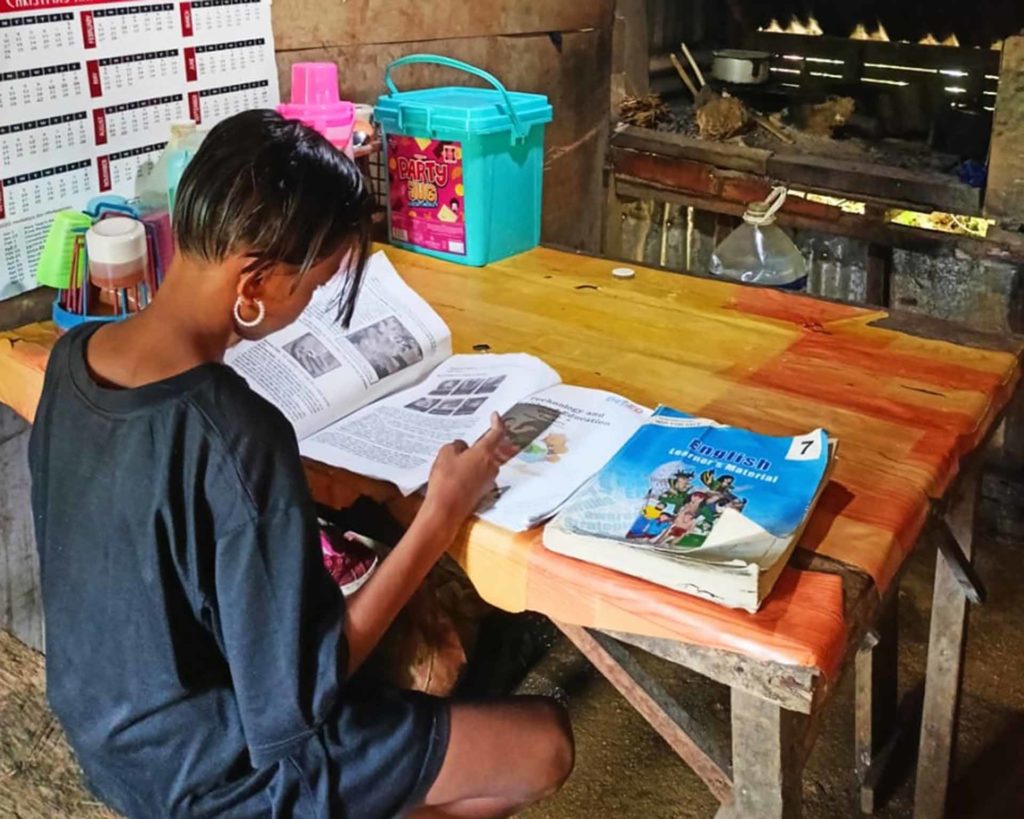Light brings hope to a boy’s dream
HILABAAN ISLAND, Eastern Samar – On any normal school day, 14-year-old Danny (not his real name) should have been attending his classes as an eighth-grade student.
HILABAAN ISLAND, Eastern Samar – On any normal school day, 14-year-old Danny (not his real name) should have been attending his classes as an eighth-grade student.
HILABAAN ISLAND, Eastern Samar – On any normal school day, 14-year-old Danny (not his real name) should have been attending his classes as an eighth-grade student.
“I miss my classes,” he said. “I have asked permission from my teacher, and she agreed. But I don’t want to incur absences because I want to be on the honor roll on the next recognition day.”
Erlinda Pana, his Grade 8 class adviser, says Danny almost made it to the honor roll in the previous quarter, but his grades fell short of the minimum requirement. Nevertheless, she notes that Danny is now actively participating in class discussions, a remarkable improvement that she did not see in him before.
“I have seen tremendous improvement in his academic performance in the past few months. He may likely get an honor if he continues to improve,” she said.
To recognize his great improvement in academics, the teacher awarded Danny with “Best in Behavior” as a recognition for his good class standing.
“I want to give recognition to my students who show great determination in their studies to inspire them to continue to work hard,” Pana added.
Third from the youngest in a brood of 13, Danny said he knows that only through education can he have a bright future, fulfill his dream, and help his family out of poverty.
“I dream of becoming an engineer in the future,” he says. “Engineers build big and beautiful houses. I hope I can also build one for my family.”
He says that to fulfill his dream, he must study hard while still young.
“I always focus in class to understand our lessons because there is nobody to tutor me. I study by myself,” he said.
Danny says he is much inspired by his studies now that there is electricity in their house. “Before, I did not want to study at night because my eyes get sore from reading,” he says.
Danny’s turning point came when a standalone solar-powered home system was installed in their house. Danny says he purposely remembered the date when the solar home system was installed as it also serves as one milestone for his family.
“I am now inspired to study harder and can better participate during class recitations. Like my classmates, I can now be on the honor roll.”

The solar-powered home system was provided by Oxfam Pilipinas and its partner organization, Sentro para sa Ikauunlad ng Katutubong Agham at Teknolohiya, Inc. (SIKAT), through the Just Energy Transition (JET) project.
The project seeks to showcase sustainable power sources in off-grid communities like Hilabaan island, which is situated seven kilometers from the mainland in Dolores, Eastern Samar. It provides standalone solar-powered home systems to households in far-flung sitios (sub-village), while those living near the village center are connected through a micro-grid with energy coming from a solar-run powerhouse.
I can already study and do my homework at night without straining my eyes. It is also easier for things at night. We can also charge our mobile phones during the day.”
Danny
Danny said that his family used to have two kerosene lamps to light their house at night. His family spends P10 a day – or roughly P300 a month – for the kerosene alone, which is not even enough to last the whole night. Meanwhile, charging mobile phones in houses with generator costs P10.
“Somehow, this lessens the financial burden of my family,” he added.
Clarita Cabreros, Danny’s English teacher back in Grade 7, said students who have electricity at home perform better in school than those without electricity.
“Solar-powered electricity improved the class performance of the students because they can study well even when there is power outage, unlike before,” she said.
“Many parents are encouraged to buy Wi-Fi routers for their students to have internet access because the electricity supply is continuous,” she said.
The community is no longer dark as it used to be. Another teacher, Arturo Tegero, even said that students are no longer afraid to go to their classmates’ houses at night, to ask about their lessons or work on group assignments.
“Solar-powered lights provide the students a sense of safety and security. They can also stay up late at night to study lessons or do their homework or school project because they feel safe. They are now also unafraid to sleep with lights on, unlike when they were still using kerosene lamps which may cause fire,” he said.
But for Danny, the light from the solar home system that shines brightly to illuminate his house is also a symbol of an optimistic future ahead of him.
“Light is a symbol of a bright future,” Danny said.